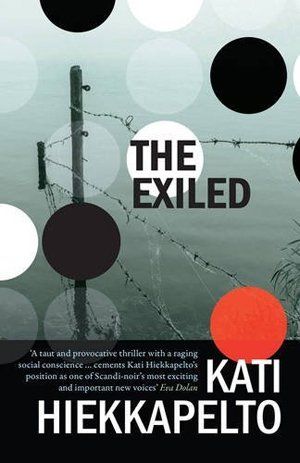
The story takes place over the 16 days before the bloom, and police detective Anna Fekete is visiting her friends and family in Kanisza, a Hungarian community surrounded by Serbs in what used to be Yugoslavia. As the story opens Anna is out drinking wine, trying to unwind after her arrival back home. She grew up in Finland after fleeing the Balkan conflict with her mother and brother in the 1990s, becoming a police detective like her late father. The wine is flowing, and during a minor commotion Anna is jostled and her purse is stolen. She and her friends give chase, but the thief and a young girl in a red dress escape into the night.
She reports the theft to the police and all too quickly the crime has been solved. Her purse is found, sans passport and cash, near the corpse of a Romani man in an overgrown area by the river. The police say he drowned but to satisfy her detective instincts she asks to see the autopsy, receiving help from an old family friend called Kovacs Gabor, once a colleague Anna’s father in the Yugoslav police.
Quickly Anna’s mind is picking away at the inconsistencies in the report and lax attitude of the police. Nagy Bela, another old family friend, is a fisherman on the river and he shows her where the body was found. He also says that he saw the man’s corpse and doesn’t believe he drowned.
The lack of police concern, and Gabor’s advice that she let them deal with it, only egg her on. You’ll quickly see how thoroughly constructed Hiekkapelto’s protagonist is, and how sharp and determined she is. As an ethnic Hungarian growing up in Finland, she was an outsider. Returning home she finds she’s an outsider there too. But that won’t stop her.
The town, with all its interwoven cultures and personalities, is beautifully described and you can tell the author has a deep connection to the area. It’s not just the streets and squares, river and surrounding countryside that come to life. The ins and outs of the community are revealed in nearly every scene. There are the surly Serb cops, the prim and proper Hungarians, the picked upon gypsies, and the desperate Middle Eastern migrants trying to make their way into the EU. You’ll see hard right attitudes at play, and great sympathy and humanity as well. It’s all woven into the story – sometimes in unexpected ways.
Anna befriends a Romani woman called Judit, who not only reads her cards, but helps her discover a possible link between the dead man by the river and the death of her own father. Anna looks around her and wonders what people know that she doesn’t, and why the retired cop Kovacs and the fisherman Nagy are discouraging her digging around. Their chorus is joined by local politician Remy Mihaly and the priest Molnar Laszlo. And, of course, Anna’s mother, who is desperate that the past remain buried.
All the decorum of old Hungary hangs like the fug of smoke and smell of home-made brandy in the Fekete household. But out there somewhere is the girl in the red dress, who slipped off into the night. If the man she was with was killed by the river, what lies in store for the girl?
The Exiled will have you second guessing just about every character, trying to work out if they’re helping or hindering Anna and whether our heroine is in danger or not. What she finds out about her father’s death could break her heart, and could leave her in mortal danger. But while you’re willing her on, part of you will not want the mystery to be solved because that will mean the end of the book. Then, you’ll have to say goodbye to this incredibly evoked, half-forgotten town somewhere in the middle of Europe. A place where every home smells smoky, they drink palinka at 10am, and wait for the mayflies to bloom in June.
For more Finnish crime fiction, try The Healer by Antti Tuomainen.
Orenda Books
Print/Kindle/iBook
£4.79
CFL Rating: 5 Stars